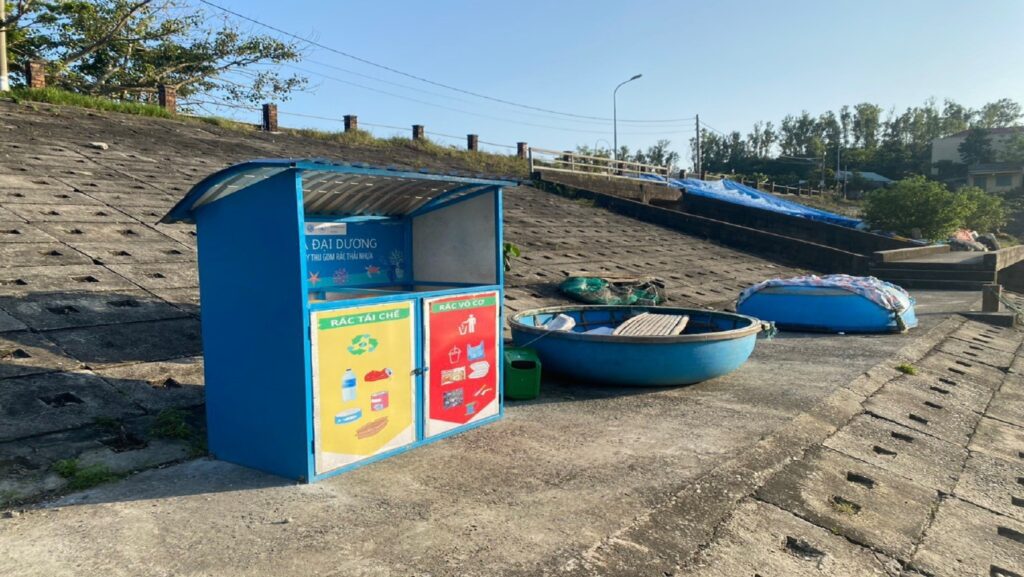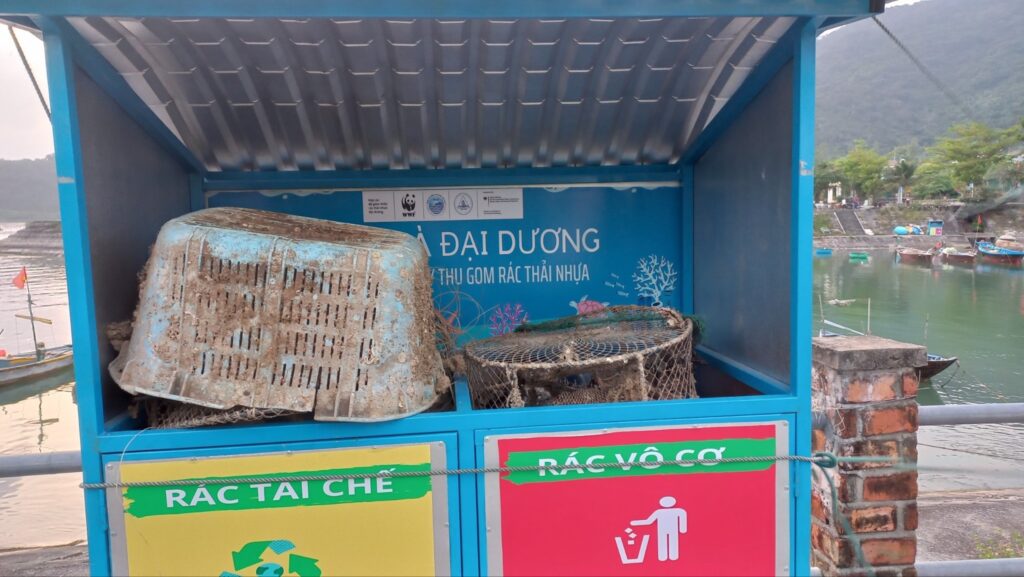At 3 AM, Nguyen Tan Hung sets out on his small wooden boat to the sea every day. His eyes scan the waters not just for fish but also for something else – plastic waste.

Mr. Hung is a fisherman born and raised amidst the Cu Lao Cham islands, a Marine Protected Area just off the coast of Central Viet Nam. “As a fisherman, I understand that coral reefs are the nurseries for small fish and shrimp, the heart of the ocean. They nurture these small fish and shrimp until they grow up and venture out into the sea, becoming part of our livelihood. Without coral reefs, there is no fishing,” he shared.
During the monsoon season, ghost gear and other plastic debris often wash ashore, entangling and damaging vibrant coral reefs. Recognising the impact that plastic pollution has on marine ecosystems and their ability to sustain coastal livelihoods, over the last two years, Mr. Hung has taken it upon himself to collect plastic waste from the sea on his fishing trips.
But this was not always the case.
Ghosts in the water — lost and discarded gear plague fishermen
For years now, fishermen in Cu Lao Cham have been complaining of their catch being entangled with marine plastic debris, making the process of fishing and harvesting more laborious and time-consuming. Most of what the trash pulled up are ghost nets – lost and discarded fishing gear, as well as plastic bags, and broken plastic fragments of household products.
As fishermen untangle plastic debris from their nets, they mostly toss it back into the sea. Plastic waste soaked in seawater for long periods of time, especially ghost nets, become slimy, smelly, and unappealing, making it unlikely for fishermen to want to retrieve them. Bringing in marine plastic debris also takes up space and adds load to the boat, an inconvenience that most fishermen do not wish to suffer.
For Mr. Hung, however, discarding plastic debris back into the ocean is not an option. Over the last two years, he has been tirelessly collecting plastic waste from the sea, often bringing back to shore 50 – 70 kilograms of plastic waste each time. He carefully segregates these on his boat before placing them in bags or sacks to bring back to land.
Inspired by My Hung, the Cu Lao Cham Marine Protected Area Management Board (MPA) worked with WWF-Viet Nam and Plastic Smart Cities to set up designated bins called “Ocean Home”. In collaboration with the local farmer association, the initiative sought to encourage more fishermen to bring back their collected waste. Since 2022, 26 fishermen have come on board, pledging their commitment to support this cause voluntarily.


Designated bins, nicknamed “Ocean Home”, have been set up along fishing coast for fishermen to deposit plastic waste brought in from the sea. Photo © Cu Lao Cham MPA
Marine Litter Management: Success of Ocean Homes Initiative
With support from the project Mitigating Marine Plastic Debris in Viet Nam, Cham Island’s “Ocean Homes” now provide 6 drop-off locations for fishermen to dispose of collected trash after their fishing trip. Since February 2023, around 140 kg of marine litter is collected each month, of which 96% is composed of plastic and mixed waste, with only 4% are recyclable. The data is being monitored by the Cu Lao Cham MPA authorities.

At an ocean cleanup event on 25-26 June 2024, the Cu Lao Cham MPA organised a promotional activity to encourage more fishermen to collect marine plastic encountered on their fishing trips – via a trash exchange initiative where marine litter retrieved could be exchanged for boat fuel. More than 170 residents actively participated, with a strong turnout from Bai Lang, Bai Ong (approximately 100 people), and Bai Huong (over 70 people). The community’s efforts resulted in the collection of nearly 2,400 kg of waste, consisting of 2,200 kg of ropes, buoys, and styrofoam, and over 100 kg of old nets, and various other items.
Community Stewardship: Local Champions Lead by Example
In the serene realm of Cu Lao Cham, Mr. Hung embodies the essence of stewardship, his daily efforts weaving a tapestry of responsibility and sustainability. Even on holidays and weekends, he roams the neighborhood, meticulously picking up plastic waste from the village streets and the shores. His aspirations for future generations and the pristine nature of Cu Lao Cham drive his actions: he strives to contribute his part to the collective protection of the ocean, envisioning cleaner waters and healthier ecosystems for fish and oceanic species.
Leading by example, Mr. Hung hopes to inspire his descendants and the local youth to emulate his commitment. Amidst the grassroots movements in Cu Lao Cham, where women carry baskets instead of plastic bags to the market, Mr. Hung finds his own avenue to contribute, emphasising that every effort, no matter how small, counts. He dreams of a community where more fishermen join him in bringing back plastic waste ashore. Mr. Hung’s dedication paints him as a true oceanic steward, and his call to action echoes loudly across the waves, beckoning others to join him in safeguarding the precious marine environment.


